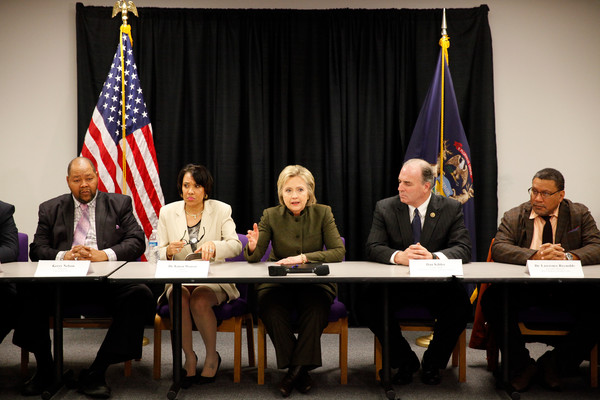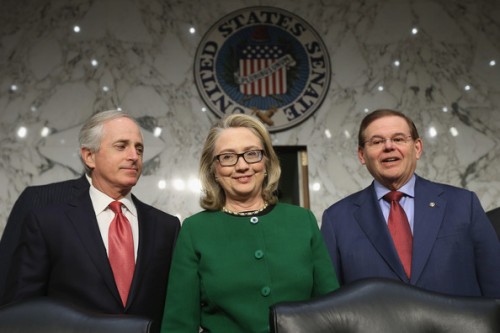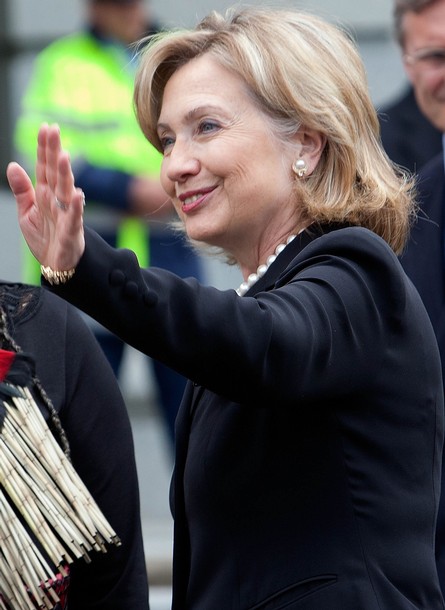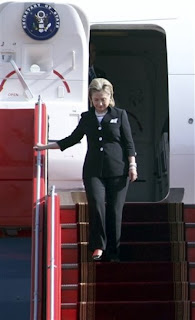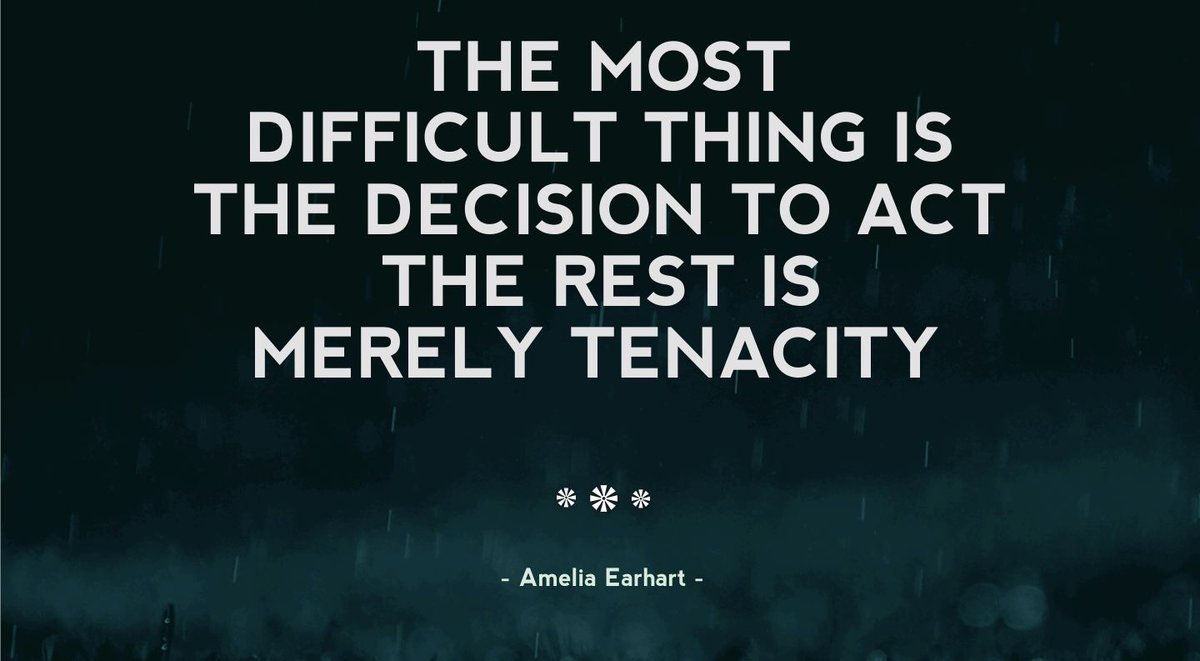Hillary introduces this chapter with a June 2012 meeting called by Special Envoy Kofi Annan to try to recruit international political backing for his plan for peaceful transition in Syria. Protests had been going on for a year-and-a-half and had been met with brutal assaults by government forces.
Hillary Clinton: Press Conference Following Syria Action Group Meeting
June 30, 2012 by still4hill

Hillary Clinton: Interviews from Geneva
July 1, 2012

********************************************************
The Syrian revolution had begun in early 2011 as peaceful protests inspired by those in Tunisia and Egypt and had evolved into a civil war as rebel groups first took up arms to defend themselves and then resolved to overthrow Bashar Al-Assad.
Hillary explains that she recommended Robert Ford to serve as ambassador to Syria and that he was just settled in when the protests escalated in March.
She provides some background as to who Assad is, how he came to power and why Russia stalwartly backed up Assad’s regime. She delves into the sects in this very diverse country. Sunnis were overwhelmingly (about 70%) the majority population. Assad’s Alawites, the ruling class and a small minority (about 12%) , are a Shite sect. About 10% were Druze – a Christian branch with Shite, and other, roots.
Secretaries Clinton and Gates on Meet The Press
March 27, 2011 by still4hill |
QUESTION: First, as we look at the Broader Middle East, we look at Syria – deadly protests because of a government crackdown that have been occurring over the past few days. Is it the position of the government that we would like to see the Asad regime fall?
SECRETARY CLINTON: What we have said is what we’ve said throughout this extraordinary period of transformation in North Africa and the Middle East. We want to see no violence, we want to see peaceful protest that enables people to express their universal human rights, and we want to see economic and political reform. That’s what we’ve called on in Syria, that’s what we’ve called on other governments across the region to do.
Secretaries Clinton and Gates on Face The Nation
March 27, 2011 by still4hill
QUESTION: Good morning again. And we are joined in the studio by the Secretary of State and the Secretary of Defense.
Madam Secretary, let me start with you. Tens of thousands of people have turned out protesting in Syria, which has been under the iron grip of the Asad for so many years now, one of the most repressive regimes in the world, I suppose. And when the demonstrators turned out, the regime opened fire and killed a number of civilians. Can we expect the United States to enter the conflict in the way we have entered the conflict in Libya?
SECRETARY CLINTON: No. Each of these situations is unique, Bob. Certainly, we deplore the violence in Syria. We call, as we have on all of these governments during this period of the Arab Awakening, as some have called it, to be responding to their people’s needs, not to engage in violence, permit peaceful protests, and begin a process of economic and political reform.
The situation in Libya, which engendered so much concern from around the international community, had a leader who used military force against the protestors from one end of his country to the other, who publically said things like, “We’ll show no mercy. We’ll go house to house.” And the international community moved with great speed, in part because there’s a history here. This is someone who has behaved in a way that caused grave concern in the past 40 plus years in the Arab world, the African world, Europe, and the United States.
QUESTION: But, I mean, how can that be worse than what has happened in Syria over the years, where Bashar Asad’s father killed 25,000 people at a lick? I mean, they open fire with live ammunition on these civilians. Why is that different from Libya?
SECRETARY CLINTON: Well, I –
QUESTION: This is a friend of Iran, an enemy of Israel.
SECRETARY CLINTON: Well, if there were a coalition of the international community, if there were the passage of Security Council resolution, if there were a call by the Arab League, if there was a condemnation that was universal – but that is not going to happen, because I don’t think that it’s yet clear what will occur, what will unfold.
There’s a different leader in Syria now. Many of the members of Congress of both parties who have gone to Syria in recent months have said they believe he’s a reformer. What’s been happening there the last few weeks is deeply concerning, but there’s a difference between calling out aircraft and indiscriminately strafing and bombing your own cities and then police actions, which, frankly, have exceeded the use of force that any of us would want to see.
Secretary Clinton’s Remarks at the U.S.-Islamic World Forum
April 13, 2011 by still4hill
And as President Obama has said, we strongly condemn the violence committed against peaceful protesters by the Syrian Government over the past few weeks. President Asad and the Syrian Government must respect the rights of the Syrian people, who are demanding the freedoms that they have long been denied.
Hillary Clinton to Human Rights Council: Reject Syria’s Candidacy
April 30, 2011 by still4hill
Today the UN Human Rights Council took urgent action to shine a light on the deteriorating human rights situation in Syria and condemn the continued human rights abuses by the Syrian government. Today’s resolution – passed with an overwhelming majority by members from all regions of the globe – unequivocally indicates that the use of force by the Syrian government to quell peaceful political demonstrators is unacceptable. The international community has spoken and expressed its outrage at the violence used by the Syrian government to deny its population their universal human rights, including the freedoms of expression and assembly…
The findings of this Special Session further reinforce the crucial need for Council members to reject Syria’s hypocritical candidacy for membership on the Human Rights Council. No country engaged in such horrific and ongoing human rights abuses should be considered for membership on this important body.
Secretary Clinton’s Remarks on the Violence in Syria
May 6, 2011 by still4hill
The Syrian people, like people everywhere, have the inherent right to exercise their universal freedoms, including peaceful assembly, expression, and speech. The Syrian Government must respond to the Syrian people’s call for change. It must realize that violence and intimidation will not answer their call.
The Syrian Government’s actions are neither those of a responsible government nor a credible member of the international community. We will continue to hold to account senior Syrian officials and others responsible for the reprehensible human rights abuses against the Syrian people. We welcome the European Union’s decision to join us in these efforts with similar steps. We will also continue to work both unilaterally and with our international partners to determine the most effective next steps if the Syrian Government chooses not to abandon its current path.
Hillary Clinton on the Shutdown of the Internet in Syria
June 4, 2011 by still4hill
Two weeks ago, the White House released the International Strategy for Cyberspace, which noted that “States should not arbitrarily deprive or disrupt individuals’ access to the Internet or other networked technologies.” We condemn such shutdowns in the strongest terms.
The Syrian government has a history of restricting the Internet in an attempt to prevent the Syrian people from accessing and sharing information. The Syrian government must understand that attempting to silence its population cannot prevent the transition currently taking place.
Hillary Rodham Clinton: IAEA Resolution on Syria
June 9, 2011 by still4hill
Today in Vienna, the International Atomic Energy Agency (IAEA) Board of Governors adopted a resolution, co-sponsored by fourteen nations, finding Syria in noncompliance with its international nuclear obligations. This is an important step given the troubling findings in the IAEA’s latest report — including Syria’s demonstrated refusal to cooperate with the IAEA investigation and its attempts to construct a secret nuclear reactor with the assistance of North Korea. We fully welcome the IAEA’s actions today to address this issue with the seriousness it deserves.
Secretary Clinton’s Statement: Repression in Iran and Syria
June 14, 2011 by still4hill
… today in Syria, Iran is supporting the Asad regime’s vicious assaults on peaceful protesters and military actions against its own cities. The world was shocked by images of a 13-year-old Syrian boy, tortured and mutilated by Syrian security forces. It reminded us of a young Iranian woman, killed in the street two years ago for all to see.
Secretary Clinton Supports Syrian People in Op-Ed
June 17, 2011 by still4hill
In an op-ed in the Asharq Al-Awsat newspaper, Secretary of State Hillary Rodham Clinton condemns the violent crackdown in Syria and calls for a transition to democracy. The full text of the Secretary’s op-ed follows.
“There Is No Going Back in Syria”
By Hillary Clinton
As the violent crackdown in Syria continues, President Assad has shown that he is more interested in his own power than his people.
Secretary Clinton’s Statement on Continuing Violence in Syria
August 1, 2011 by still4hill
The Syrian regime’s violent assault on civilians continued today, even as Ramadan began, highlighting again the brutality and viciousness of the Assad regime. Yesterday, President Obama said that President Assad has shown that he is incapable and unwilling to respond to the legitimate grievances of the Syrian people. Today, as the campaign of violence continues, President Assad is further ensuring that he and his regime will be left in the past, and that the Syrian people themselves will be the ones to determine its future.
Secretary Clinton’s Remarks After Meeting With Syrian Activists
August 2, 2011 by still4hill |
Our view remains that strong action by the Security Council on the targeting of innocent civilians in Syria is long overdue. Some members of the Security Council continue to oppose any action that would call on President Assad to stop the killing, and we urge them to reconsider their positions.
Video: Secretary Clinton’s Statement on Syria
August 18, 2011 by still4hill
We are heartened that, later today, the UN Security Council will meet again to discuss this ongoing threat to international peace and stability. We are also working to schedule a special session of the United Nations Human Rights Council that will examine the regime’s widespread abuses. Earlier this week, I explained how the United States has been engaged in a relentless and systematic effort with the international community, pursuing a set of actions and statements that make crystal clear where we all stand, and generating broader and deeper pressure on the Asad regime.
Hillary Clinton’s Statement on The Human Rights Council’s Special Session on Syria & State Department Update on Libya
August 23, 2011 by still4hill
I congratulate the Human Rights Council for its work to create an international independent Commission of Inquiry to investigate the deteriorating human rights situation in Syria and to make clear the world’s concern for the Syrian people.
In October 2011, the Russian-Chinese coalition in the Security Council first exerted veto power against what Hillary terms a modest resolution condemning Assad’s human rights abuses and supporting peaceful protests.
The Arab League demanded a cease-fire. When the attacks on rebels continued, Syria was suspended from the league.
Hillary Clinton: Arab League Suspends Syria
November 12, 2011 by still4hill
In December, the Arab League sent monitors in.
Secretary Clinton’s Meeting with Syrian National Council
December 6, 2011 by still4hill
… let me begin by saying that it’s an honor to meet with all of you, the president and senior members of the Syrian National Council. I look forward to our discussion and hearing from each of you. I am particularly interested in the work you are doing about how a democratic transition would proceed. Fred Hof, my special coordinator, has told me that you’ve put a lot of work into that paper, and there are many very constructive ideas in it, because obviously, a democratic transition includes more than removing the Asad regime. It means setting Syria on the path of the rule of law and protecting the universal rights of all citizens regardless of sect or ethnicity or gender.
Second, we will discuss the work that the Council is doing to ensure that their plan is to reach out to all minorities, to counter the regime’s divide-and-conquer approach, which pits ethnic and religious groups against one another. The Syrian opposition, as represented here, recognizes that Syria’s minorities have legitimate questions and concerns about their future, and that they need to be assured that Syria will be better off under a regime of tolerance and freedom that provides opportunity and respect and dignity on the basis of the consent rather than on the whims of a dictator.
Frustrated, in late January the Arab League withdrew the monitors and asked the Security Council to step in.
Secretary Clinton: Escalation of Regime Violence in Syria
January 30, 2012 by still4hill
Hillary attended a special session of the Security Council.
Secretary Clinton at the U.N. Security Council
January 31, 2012 by still4hill
So why is the Arab League here before this Security Council? Because they are seeking the support of the international community for a negotiated, peaceful political solution to this crisis and a responsible, democratic transition in Syria. And we all have a choice: Stand with the people of Syria and the region or become complicit in the continuing violence there…
Now, I know that some members here may be concerned that the Security Council could be headed toward another Libya. That is a false analogy. Syria is a unique situation that requires its own approach, tailored to the specific circumstances occurring there.
Hillary Clinton: Remarks to the Press at the U.N.
January 31, 2012 by still4hill
While this Munich Conference was going on there was a surge in violence in Syria as regime forces attacked the city of Homs. While Hillary was in Europe, the Security Council voted and Russia and China blocked the resolution.
Secretary Clinton at the Munich Security Conference
February 4, 2012 by still4hill
Robert Ford was an intrepid ambassador amid chaos and routinely faced down danger in order to maintain friendly ties with the Syrian people.
Ambassador Ford Carries Forth In Absentia
February 10, 2012 by still4hill

Hillary Clinton: Press Availability After G-20 Los Cabos
February 20, 2012 by still4hill
I think, like the UN General Assembly resolution that passed overwhelmingly last week, the upcoming meeting will demonstrate that Assad’s regime is increasingly isolated and that the brave Syrian people need our support and solidarity. Their suffering has to be addressed, so we have to focus on humanitarian issues and think of the best ways to deliver the necessary humanitarian aid. We have to work toward an inclusive, democratic process to lead a transition. Every group of Syrians needs to feel that they are represented, that their interests will be respected. We have to prepare for the likelihood that the Syrian regime is going to be under increasing pressure, which will create perhaps more space for all of us to push hard on a transition. And we will intensify our diplomatic outreach to those countries that are still supporting the Assad regime.
This is a challenging process, but mostly for the people of Syria, who every day are living with the results of this brutal crackdown that they are suffering under. So I don’t want to get ahead of the meeting that will be a very large gathering that will demonstrate, once again, the international unity in the face of the Assad regime. We’ll send a clear message to Russia, China, and others, who are still unsure about how to handle the increasing violence, but are, up until now, unfortunately, making the wrong choices. And I think we’ll have more to say as we go through this week and after the meeting.
Hillary Clinton at Friends of Syria in Tunisia
February 24, 2012 by still4hill

… we are firmly committed to the sovereignty, independence, national unity, and territorial integrity of Syria.
In support of these principles, this group should take concrete action along three lines: provide emergency humanitarian relief, ratchet up pressure on the regime, and prepare for a democratic transition.
Hillary Clinton’s Press Availability on Friends of Syria
February 24, 2012 by still4hill

Hillary Clinton at the U.N. Security Council
March 12, 2012 by still4hill
Five weeks ago, this council was unable to stand united against the horrific campaign of violence that has shocked the conscience of the world, one that continues unabated as we meet. We were blocked from even condemning the violence and endorsing a peaceful plan developed by Syria’s own neighbors.
Now the United States believes firmly in the sovereignty and territorial integrity of all member-states, but we do not believe that sovereignty demands that this council stand silent when governments massacre their own people, threatening regional peace and security in the process. And we reject any equivalence between premeditated murders by a government’s military machine and the actions of civilians under siege driven to self-defense. How cynical that even as Assad was receiving former Secretary General Kofi Annan, the Syrian army was conducting a fresh assault on Idlib and continuing its aggression in Hama, Homs, and Rastan.
Hillary Clinton’s Presser at the U.N.
March 12, 2012 by still4hill
Now is the time for all nations, even those who have previously blocked our efforts, to stand behind the humanitarian and political approach spelled out by the Arab League. We should say with one voice as an international community that the killing of innocent Syrians must stop, and a political transition begin.
Secretary Clinton: Intervention to the Friends of the Syrian People
April 2, 2012 by still4hill
Secretary Clinton’s Remarks Following Meeting with Syrian National Council
April 1, 2012 by still4hill

Secretary Clinton’s Remarks at the Ad Hoc Ministerial on Syria
April 19, 2012 by still4hill
I think we are all here out of a sense of great frustration and outrage over what we see occurring in Syria. We also are hopeful that, despite the evidence thus far, the mission of Kofi Annan can begin to take root, starting with monitors being sent, but remembering that it’s a six-point plan and that it’s not a menu of options. It has to be a complete acceptance by the Syrian government of all six points.
Clinton Condemns Haoula Massacre in Strongest Possible Terms
May 26, 2012 by still4hill
We stand in solidarity with the Syrian people and the peaceful marchers in cities across Syria who have taken to the streets to denounce the massacre in Haoula.
Syria Violence Could Have Domino Effect In Lebanon, Clinton Warns
May 25, 2012 by still4hill
Video: Secretary Clinton Remarks on Syria
May 31, 2012 by still4hill
Hillary Clinton: Friends of the Syrian People
June 6, 2012 by still4hill
Sanctions are having an impact: businesses and organizations are cutting their ties with the regime, senior officials responsible for human rights violations have had their funds frozen and their travel curtailed, and we are disrupting the ability of the regime to receive weapons and other supplies. These sanctions are specifically pointed at members of the regime and its war machine; they do not target the Syrian people and do not apply to supplies of critical goods. It is the regime that is causing Syrians to suffer from economic hardship, to deprive them of fuel, cooking oil, and other essentials.


Hillary Clinton Condemns Syrian Downing of Turkish F-4 in the Strongest Possible Terms
June 24, 2012 by still
I spoke with Turkish Foreign Minister Davutoglu yesterday to convey our grave concern about the downing of a Turkish F-4 fighter jet by Syrian forces on June 22. I also told him that our thoughts and prayers are with the missing pilots and their loved ones… The United States condemns this brazen and unacceptable act in the strongest possible terms. It is yet another reflection of the Syrian authorities’ callous disregard for international norms, human life, and peace and security.
We did not receive any transcripts of the public portion of this summit nor any video. Hillary notes that the public portion is scripted and can be boring. The action starts when the cameras leave. That is what happened at this summit. They left the ceremonial hall for a conference chamber – each party plus a single aide with Ban Ki-Moon and Kofi Annan heading a long rectangular table. Hillary reports high emotions and even table-pounding (!) that eventually settled into a face-off between her and Lavrov which, she says, was where it was always headed. Finally it all boiled down to wordsmithing. (Doesn’t everything?)
An agreement was crafted and everyone signed. Then it was time to face the press who picked up the wrong message.
Hillary Clinton: Press Conference Following Syria Action Group Meeting
June 30, 2012 by still4hill
Kofi Annan called this meeting to mobilize the political will needed to implement his six-point plan. And after a long day of intense discussions, the next steps are clear…
No one has any illusions about the difficulties ahead. We are dealing with not only a murderous regime in a combustible region, but the potential for that region to be gravely affected by the continuance of this violence. But the stakes of inaction by the international community are just too high…
Kofi Annan has offered a plan to avoid that path, and we should spare no effort to support him….
QUESTION: Madam Secretary – I don’t know – I’ll just speak really loudly. Oh, it’s working? Okay. Listen, for all intents and purposes, it looks like the Russians have won here. There is no exclusionary language in the document that has been agreed to, whereas the draft contained language that would exclude people deemed to be bad for the transition. This speaks only of mutual consent, which would seem to give both sides – the Assad government and the opposition – veto power, which seems to be a recipe for continued stalemate.
Can you address why you think this calls for – in your own words, what you said, lays the way – paves the way for a post-Assad future, when in fact, it doesn’t require him to leave and leaves open – and it leaves the open – it leaves open the – leaves the question open entirely? Thank you.
SECRETARY CLINTON: Well, I disagree with your premise, obviously, because as I’ve made clear all week, we supported the Joint Special Envoy’s original text, but we agreed to some changes that we did not believe affected the substance, because frankly, we read the results to be the same. Assad will still have to go. He will never pass the mutual consent test, given the blood on his hands. I think you already heard Kofi Annan basically say the very same thing. The text also makes clear that the power to govern is vested fully in the transitional governing body, which strips him and his regime of all authority if he and they refuse to step down and leave.
Now, every day that has gone by without unity on the Security Council and among the states gathered here has been a day that has given comfort to Assad and his cronies and supporters. What we have done here is to strip away the fiction that he and those with blood on their hands can stay in power. The plan calls for the Assad regime to give way to a new transitional governing body that will have full governance powers.

Hillary Clinton: Saddened and Outraged by Massacre in Traymseh
July 13, 2012 by still4hill
I was deeply saddened and outraged to learn of reports of yet another massacre committed by the Syrian regime that has claimed the lives of over 200 men, women, and children in the village of Traymseh…
As long as the Assad regime continues to wage war against the Syrian people, the international community must keep increasing the pressure on the regime to halt the violence and allow for a political solution to go forward. The Security Council should put its full weight behind the Annan plan for an immediate ceasefire and a political transition and make clear to the Syrian regime that there will be consequences for non-compliance. History will judge this Council.
Hillary Clinton at the Friends of the Syrian People Ministerial Meeting
July 6, 2012 by still4hill
What was accomplished in Geneva by the action group was, for the very first time, to enlist not only all five permanent members of the Security Council including Russia and China, but also important leaders in the region and in the Arab League in support of such a transition. The issue now is to determine how best to put into action what was accomplished there and is continuing here…
Under the Geneva communique, the opposition is for the first time put on an even basis with the government. They are given equal power in constituting the transition governing entity that will have, as we just heard, full executive authority. That could not have been imagined three months ago, let alone a year ago.
So although none of us here is satisfied or comfortable with what is still going on inside of Syria, because it is against every norm of international law and human decency for a government to be murdering its own people, there has been in the last several months, starting in Tunisia, a steady, inexorable march toward ending this regime. What we need to do is to follow through on what each of us can contribute to the end of the Assad regime and the beginning of a new day for Syria.

Hillary Clinton’s Press Conference Following the Friends of the Syrian People Meeting
July 6, 2012 by still4hill
Then, of course, sadly, came this. Poor Kofi Annan was like Sysphus pushing that infernal rock uphill. Hillary assured him that he had done his best.
Hillary Clinton on the Resignation of Kofi Annan as Joint Special Envoy for Syria
August 2, 2012 by still4hill
He worked tirelessly to try to build consensus in the international community, end the bloodshed, and usher in a government that would meet the legitimate aspirations of the Syrian people. Unfortunately, the Security Council was blocked from giving him key tools to advance his efforts.

In Turkey Hillary Clinton Talks No Fly Zones Over Syria
August 11, 2012 by still4hill
Hillary Clinton’s Remarks On Syria With Turkish Foreign Minister Davutoglu
August 11, 2012 by still4hill
Hillary and David Petraeus worked on a plan to arm a very small very well-vetted segment of the rebel population with very specific goals on paper. The president rejected the plan that Hillary called the least bad option among many even worse alternatives. (Reminding me of Ben Affleck in ‘Argo” saying his bad movie was the best bad idea that they had.) Hillary did not like losing the debate but felt she had been given a fair hearing.
Hillary Clinton on the Appointment of Lakhdar Brahimi to Replace Kofi Annan
August 17, 2012 by still4hill

Brahimi resigned the post in May of this year. Staffan de Mistura replaced him.
Hillary Clinton at the U.N. Security Council Session On Peace And Security in the Middle East
September 26, 2012 by still4hill
Unfortunately, in Syria, Bashar al-Assad clings to power, and his campaign of brutality has sparked a humanitarian crisis. The United States has committed more than $100 million to help the Syrian people. And we continue to insist that the violence must end and a political transition without Assad must move forward.
The Arab League suspended Syria from its activities and has strongly condemned the Assad regime’s brutal violence against its own people. And the Arab League created a plan for peaceful political transition that was endorsed by an overwhelming majority in the General Assembly resolution that launched Arab League-UN mediation efforts, led first by Kofi Annan and now by Lakhdar Brahimi.
Yet the atrocities mount while the Security Council remains paralyzed.

Hillary Clinton at the Ad Hoc Friends of the Syrian People Ministerial
September 28, 2012 by still4hill
Now, it is no secret that our attempts to move forward at the UN Security Council have been blocked repeatedly. On Tuesday, I met with Joint Special Representative Brahimi to discuss alternative strategies, and I look forward to hearing all of your views today. But the United States is not waiting. We are taking new steps to meet the growing humanitarian needs of the Syrian people, to support the opposition as it moves toward an inclusive, democratic transition, and to further pressure and isolate the regime.

Hillary Clinton’s Remarks on Syria
December 4, 2012 by still4hill
Hillary Clinton’s Last Press Availability From NATO HQ As SOS
December 5, 2012 by still4hill
American Leadership: Hillary Clinton’s Final Address as Secretary of State
January 31, 2013 by still4hill
In Syria, the Assad regime continues to slaughter its people and incite intercommunal conflict. Iran is pursuing its nuclear ambitions and sponsoring violent extremists across the globe. And we continue to face real terrorist threats from Yemen and North Africa.
So I will not stand here and pretend that the United States has all the solutions to these problems. We do not. But we are clear about the future we seek for the region and its peoples. We want to see a region at peace with itself and the world – where people live in dignity, not dictatorships, where entrepreneurship thrives, not extremism. And there is no doubt that getting to that future will be difficult and will require every single tool in our toolkit.
As Hillary is closing out this chapter you get the impression you are seeing Yogi Berra’s “deja vue all over again.” A year ago, she relates, in August 2013 we were all horrified to see evidence of Assad having used chemical weapons on civilian populations and air strikes were an option President Obama was strongly considering but wanted Congressional approval.
Congress was in recess (like now) and Hillary figured out a clever way to get a vote of approval. Since that idea worked so well, POTUS wanted Hillary’s input going forward as she is immensely creative (my words).
As it happened she was due at the White House shortly and did lend her unfailingly wise advice. Although the event was about wildlife trafficking, Hillary spoke about Syria as well. Unlike the State Department, the White House was not so generous in sharing transcripts so I never did find one from this event, but the video is here.
Hillary Clinton’s Remarks at the White House on Syria and the Security Dangers of Wildlife Trafficking
September 9, 2013 by still4hill

Chemical weapons destruction did commence and has been successful. But by February of this year, Hillary reports, CIA Director Brennan warned about Al Qaeda’s ability to recruit and to use Syria as a launching pad for attacks – perhaps even on the homeland – on us.
Hillary’s prediction at the point when she was writing this was that the danger would only grow (obviously it has).
What more can any of us say?
__________________________________________________________
Hillary Clinton’s ‘Hard Choices’ Retrospective: Introduction
Access other chapters of this retrospective here >>>>
__________________________________________________________
####


















